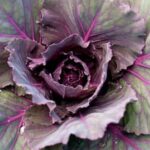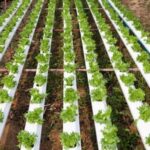Composting is a practice that has seen a resurgence in recent years, as more and more people are recognizing the importance of organic matter in gardening. One particular form of compost that has gained attention is composted manure, known for its impressive benefits in vegetable gardens. Composted manure serves as an excellent source of nutrients, improving the growth and health of vegetable plants while enriching the soil for long-term productivity.
Organic matter plays a crucial role in creating healthy and fertile soil, which is essential for successful vegetable gardening. Composted manure, when added to the soil, provides a balanced combination of vital nutrients such as nitrogen, phosphorus, and potassium. These nutrients are necessary for plant growth and development, including the production of vibrant foliage, sturdy stems, robust root systems, and ultimately bountiful harvests.
In addition to providing essential nutrients, composted manure also improves soil structure and fertility. It enhances water retention capabilities while promoting proper drainage, ensuring that plants have access to adequate moisture without being subjected to waterlogged conditions. Composted manure also supports a thriving community of beneficial microorganisms and organisms like earthworms, which contribute to the overall health of the soil ecosystem.
With its numerous benefits for vegetable gardens, it’s important to understand how composted manure differs from raw manure and how to properly compost it. By doing so, gardeners can harness its full potential to cultivate thriving vegetable crops. From understanding different types of manure best suited for specific vegetables to incorporating composted manure into the soil using proper application methods – this article will guide you through all aspects related to utilizing composted manure effectively in your vegetable garden journey.
Stay tuned as we delve deeper into understanding what makes composted manure a game-changer for your vegetable gardening endeavors.
Understanding Composted Manure
Composted manure, often referred to as “black gold” among gardeners, is a vital component of vegetable gardens due to its composition and high nutritional value. Understanding the composition and nutritional value of composted manure is essential for maximizing the benefits it provides to vegetable plants.
Composition of Composted Manure
Composted manure is different from raw manure in that it has undergone a decomposition process that transforms it into a stable, nutrient-rich organic matter. This decomposition process not only eliminates any unpleasant odors but also breaks down the raw manure into smaller particles that are easier for plants to absorb.
Composted manure is typically made up of a mixture of animal waste, such as cow, horse, chicken, or rabbit manure, along with bedding materials like straw or wood shavings that provide carbon-rich content.
Nutritional Value of Composted Manure
One of the significant benefits of composted manure lies in its high nutrient content. Three key nutrients found in composted manure are nitrogen (N), phosphorus (P), and potassium (K). Nitrogen promotes lush leafy growth in vegetables, phosphorus supports strong root development and flower production, while potassium enhances overall plant health and disease resistance.
These nutrients are released slowly over time as the microorganisms within the compost break down the organic matter. Additionally, composted manure also contains other essential micronutrients necessary for plant growth, such as calcium, magnesium, and zinc.
Impact on Vegetable Plant Health
The presence of these essential nutrients in composted manure directly contributes to improved plant health and productivity in vegetable gardens. Nitrogen aids in producing vibrant green leaves and healthy stems by supporting chlorophyll production. Phosphorus encourages robust root systems, allowing plants to efficiently absorb water and nutrients from the soil.
Potassium helps regulate processes like photosynthesis and enzyme activation, resulting in increased resistance against diseases and pests. Furthermore, the organic matter in composted manure improves soil structure and fertility, leading to improved water retention and drainage. It also promotes the growth of beneficial microorganisms that break down organic materials and make nutrients readily available for plants.
Understanding the composition and nutritional value of composted manure is crucial when considering its benefits for vegetable gardens. By incorporating composted manure into the soil, gardeners can significantly enhance plant nutrition, improve soil structure, and ultimately achieve higher yields in their vegetable crops.
The Role of Composted Manure in Soil Enrichment
Composted manure plays a crucial role in enriching the soil in vegetable gardens. By improving soil structure and fertility, enhancing water retention and drainage, and promoting soil microbial activity, composted manure creates an optimal environment for plant growth and development.
One of the key ways composted manure enriches the soil is by improving its structure. The organic matter present in composted manure helps to bind together individual soil particles, creating aggregates that improve the soil’s ability to hold nutrients, water, and air.
This results in improved root penetration and overall plant growth. Additionally, the humus content in composted manure acts as a sponge, allowing the soil to retain moisture more effectively during dry periods while also preventing waterlogging during heavy rains.
Composted manure also enhances nutrient availability in the soil. The nutrients present in composted manure, such as nitrogen (N), phosphorus (P), and potassium (K), are released slowly over time as they break down. This ensures a steady supply of essential nutrients for vegetable plants throughout their growing season. Additionally, composted manure contains a wide range of micronutrients that are necessary for plant health but may be lacking in some soils.
To maximize these benefits, it is important to ensure proper incorporation of composted manure into the vegetable garden soil. One common method is to spread a layer of composted manure evenly over the garden bed and work it into the top few inches using a garden fork or tiller.
Another approach is trenching, where trenches are dug along the planting rows and filled with composted manure before seeds or transplants are placed on top. Side-dressing involves applying composted manure around established plants during their growing season.
In summary, employing composted manure in vegetable gardens greatly contributes to soil enrichment. Its ability to improve soil structure and fertility, enhance water retention and drainage, and foster healthy microbial activity all lead to healthier and more productive vegetable plants. Incorporating composted manure into the soil through various methods ensures that the benefits are maximized, providing optimal conditions for plant growth and a bountiful harvest.
Which Types of Manure are Best for Vegetable Gardens?
Comparing Different Types of Manure
When it comes to composting manure for vegetable gardens, not all types of manure are created equal. Different animals produce manure with varying nutrient compositions, and some may be more beneficial for certain types of vegetables than others. The most commonly used types of manure for composting include horse, cow, chicken, and rabbit manure.
Horse Manure
Horse manure is a popular choice due to its widespread availability. It is relatively low in nutrients compared to other types of manure, but it still serves as a valuable source of organic matter. Horse manure contains higher levels of carbon compared to nitrogen, so it’s important to balance the carbon-to-nitrogen ratio during the composting process by adding materials high in nitrogen, such as grass clippings or vegetable scraps.
Cow Manure
Cow manure is rich in nutrients and has a well-balanced carbon-to-nitrogen ratio. It contains moderate levels of nitrogen, phosphorus, and potassium, making it suitable for most vegetable crops. However, fresh cow manure tends to have a high moisture content and may require additional carbon-rich materials like straw or dried leaves to maintain proper airflow and prevent odors during composting.
Chicken Manure
Chicken manure is exceptionally high in nitrogen and phosphorus, making it an excellent choice for leafy green vegetables that require abundant amounts of these nutrients. However, its richness can sometimes pose a challenge as excessive levels of nitrogen can burn plants if not properly composted. Therefore, it’s crucial to combine chicken manure with ample amounts of bedding material like wood shavings or sawdust to balance out the nutrient content during composting.
Rabbit Manure
Rabbit manure is known for its convenience and ease of use in composting. It has one of the highest nutrient contents among animal manures, particularly in nitrogen and phosphorus. Rabbit manure also has a balanced carbon-to-nitrogen ratio, making it suitable for a wide range of vegetable crops. It is generally considered a “cool” manure that does not require aging or prolonged composting before use.
Choosing the Ideal Manure Type
The choice of which type of manure is best for your vegetable garden depends on several factors, including the specific nutrient requirements of your crops and the availability of different types in your area. If you have access to multiple types of manure, consider blending them together to create a well-balanced compost with a diverse range of nutrients.
It’s also important to note that using raw or fresh manure directly on vegetable gardens can lead to potential health risks and may harm plants due to high ammonia levels or the presence of harmful pathogens. Composting manure helps break down these issues over time.
Ultimately, it is recommended to adapt your choices based on the individual needs and conditions of your vegetable garden. Consider conducting soil tests to determine any existing nutrient deficiencies or imbalances before selecting the appropriate type(s) of manure that will help address those needs effectively.
How to Properly Compost Manure for Vegetable Gardens
Composting manure is a simple and effective way to harness the benefits of organic matter for vegetable gardens. When done correctly, composting can transform raw manure into nutrient-rich compost that promotes healthy plant growth and enhances soil fertility. In this section, we will dive into the composting process, providing step-by-step instructions on how to properly compost manure for vegetable gardens.
The first step in composting manure is to gather the necessary materials. You will need a mixture of fresh manure, carbon-rich materials such as straw or sawdust, and water. It is important to note that not all types of manure are suitable for composting, so be sure to choose manure from herbivorous animals like cows, horses, rabbits, or chickens. Avoid using manure from carnivorous animals or pets, as it may contain pathogens that could harm your garden plants.
Once you have gathered your materials, the next step is to create a balanced mix of carbon-rich and nitrogen-rich ingredients. The ideal ratio is roughly 3 parts carbon to 1 part nitrogen.
Layer alternating layers of manure and carbon-rich materials in your compost pile or bin while keeping it moist but not soggy. The microbes responsible for breaking down the organic matter require oxygen, so it’s crucial to turn the pile every few weeks to aerate it.
Composting time can vary depending on factors such as temperature and moisture levels. On average, it takes about three to six months for the composted manure to fully decompose and become ready for use in vegetable gardens. You will know it is ready when the material has turned dark brown or black with an earthy smell and crumbly texture.
Properly composted manure offers numerous benefits to vegetable gardens by providing essential nutrients while improving soil structure and microbial activity. By following the composting process outlined above, you can create nutrient-rich compost that will support the growth and vitality of your vegetable plants.
Applying Composted Manure in Vegetable Gardens
When it comes to reaping the benefits of composted manure in your vegetable garden, knowing how and when to apply it is essential. Proper application ensures that the nutrients from the composted manure are effectively absorbed by the vegetable plants, leading to improved growth, productivity, and overall health.
Timing and Method
Before applying composted manure, it is crucial to consider the timing and method of application. The best time to apply manure in a vegetable garden is during the fall or early spring, as this allows sufficient time for the nutrients to break down and become available for plant uptake.
There are several methods you can use to apply composted manure:
– Top-Dressing: Spread a layer of composted manure evenly over the soil surface around your vegetable plants. Be careful not to cover the stems or leaves of your plants, as this can cause disease or rot.
– Trenching: Dig shallow trenches beside your rows of vegetables and fill them with composted manure. Cover the trenches with soil, creating raised planting beds that provide continuous nutrition throughout the growing season.
– Side-Dressing: Apply small amounts of composted manure directly around individual plants as they grow. This method provides a quick nutrient boost and is especially beneficial for heavy feeders like tomatoes or peppers.
Calculating the Right Amount
Determining how much composted manure to apply depends on various factors such as soil type, plant variety, and garden size. As a general rule of thumb, aim for about 1 inch (2.5 cm) of composted manure spread across your entire garden area.
To calculate more accurately:
- Measure your garden’s width and length in feet.
- Multiply these two measurements together to find your garden’s square footage.
- Multiply the square footage by 0.01 (for 1 inch of composted manure) to determine the cubic feet of composted manure you’ll need.
Example: If your garden is 10 feet wide and 15 feet long, the calculation would be as follows:
10 ft × 15 ft = 150 sq ft.
150 sq ft × 0.01 = 1.5 cubic feet of composted manure.
Incorporation and Maintenance
After applying the composted manure, it is important to incorporate it into the soil for optimal results. This can be achieved by gently mixing the composted manure into the top few inches of soil using a rake or garden fork.
To maintain the benefits of composted manure throughout the growing season:
- Regularly water your vegetable garden to ensure proper nutrient distribution.
- Monitor plant growth and health to identify any signs of deficiencies or excesses in nutrients.
- Consider additional side dressings or foliar sprays if plants show signs of nutrient deficiencies.
By following these guidelines for applying composted manure in your vegetable garden, you can maximize its benefits and create an environment that promotes healthy growth and abundant harvests. Remember that each garden is unique, so experimenting with different application methods and observing how your plants respond will help you fine-tune your approach over time.
Precautions and Potential Risks Associated with Composted Manure
Composted manure is generally considered safe and beneficial for vegetable gardens. However, it is important to be aware of potential risks and take necessary precautions to ensure the safety of your plants, soil, and yourself. This section will address common concerns regarding weed seeds, pathogens, and excessive nutrient levels in composted manure, as well as offer tips on how to minimize these risks.
One key concern when using composted manure is the presence of weed seeds. Animals that produce manure may consume plants along with their seeds, which can survive the digestive process and end up in the composted manure.
When this compost is applied to vegetable gardens, these weed seeds have the potential to germinate and compete with your crops for nutrients, water, and sunlight. To minimize weed seed contamination, it is essential to source composted manure from a reliable supplier who ensures proper heat composting temperatures (around 140°F) that kill most weed seeds.
Another risk associated with composted manure is the presence of pathogens. Raw manure can contain harmful bacteria such as E.coli or Salmonella, which can pose a health risk if transferred from the composted manure to edible vegetables.
To reduce this risk, it is crucial to properly compost the manure at high temperatures (above 130°F) for an extended period of time (at least 90-120 days). This will help eliminate potential pathogens and ensure the safety of your harvested vegetables.
Excessive nutrient levels in composted manure can also be a concern for vegetable gardens. While nutrients are essential for plant growth, an excess can lead to imbalances and negatively affect plant health.
Before applying composted manure, it is recommended to have your soil tested by a reputable laboratory or cooperative extension service to determine its nutrient content. Based on these results, you can then calculate the appropriate amount of composted manure to apply in order to meet your vegetable plants’ nutritional needs without causing an excessive nutrient load.
To minimize the risks associated with composted manure, it is crucial to follow proper composting techniques and source from reliable suppliers. Additionally, practicing good hygiene when handling and applying composted manure is essential. Always wash your hands thoroughly after handling and avoid touching your face or mouth during the process. It is also important to note that some sensitive vegetable varieties or organic gardening practices may require stricter precautions or alternative soil amendments.
Using composted manure responsibly can result in numerous benefits for your vegetable garden. However, being aware of potential risks and taking necessary precautions will help ensure a safe and successful growing season.
| Concerns | Risk Mitigation |
|---|---|
| Weed Seeds | – Source from a reliable supplier who ensures proper heat composting temperatures
|
| Pathogens | – Compost at high temperatures (above 130°F) for an extended period of time
|
| Excessive Nutrient Levels | – Have your soil tested before applying composted manure
|
Success Stories and Testimonials
Composted manure has been proven to be a valuable asset for vegetable gardens, as evidenced by numerous success stories and testimonials from experienced gardeners. These real-life experiences provide compelling evidence of the benefits and effectiveness of using composted manure in vegetable gardens.
Gardeners who have incorporated composted manure into their gardening practices have consistently reported significant improvements in crop yields, plant health, and overall garden productivity. Many have observed that their vegetables are bigger, fuller, and more abundant when grown with composted manure. This is likely due to the rich and balanced nutritional profile of composted manure, which provides essential nutrients like nitrogen, phosphorus, and potassium that are crucial for the growth and development of plants.
Furthermore, these success stories testify to the positive impact of composted manure on soil fertility and structure. Gardeners have noticed improved soil moisture retention, better drainage, and enhanced soil microbial activity after incorporating composted manure into their garden beds. These benefits contribute to healthier root systems, increased nutrient uptake by plants, and ultimately better overall plant performance.
In conclusion, the success stories and testimonials shared by experienced gardeners serve as strong evidence supporting the use of composted manure in vegetable gardens. The improvements in crop yields, plant health, soil fertility, and structure attributed to composted manure demonstrate its efficacy as a valuable resource for gardeners seeking to maximize their vegetable harvests.
By harnessing the power of organic matter through proper composting techniques and sourcing reliable suppliers, gardeners can increase the success rate of their vegetable gardens while also promoting sustainable gardening practices.
Frequently Asked Questions
How do you use composted manure in a vegetable garden?
Composted manure is a fantastic way to enrich the soil in a vegetable garden. To use composted manure, start by preparing the soil in your garden bed. Spread a layer of composted manure evenly over the surface of the soil, around 2-3 inches thick. Use a garden fork or rake to incorporate the composted manure into the top few inches of soil.
This will help improve its nutrient content and structure. Afterward, you can proceed with planting your vegetable seedlings or sowing seeds directly into the amended soil. Regularly watering and maintaining your vegetable garden will further enhance the benefits of using composted manure.
What vegetables don t like composted manure?
While most vegetables benefit from the addition of composted manure, there are a few that do not particularly thrive when it is used as a fertilizer. Root crops such as carrots and radishes may develop excessive foliage at the expense of their edible roots if they are grown in heavily composted manure soil.
These vegetables prefer well-drained soil that does not contain high levels of organic matter to ensure their proper development. It’s best to avoid using excessive amounts of composted manure when growing these specific vegetables and instead opt for lighter fertilizers suitable for root crop cultivation.
Is composted cow manure safe for vegetable gardens?
Yes, composted cow manure is generally safe for vegetable gardens when used properly. Composting cow manure helps eliminate harmful bacteria and pathogens that could be detrimental to plant health and human consumption if used fresh or inadequately processed.
The high nutrient content found in cow manure makes it an excellent natural fertilizer option for vegetable gardens, supplying essential elements like nitrogen, phosphorus, potassium, and other micronutrients crucial for plant growth. Ensure that any cow manure you use has been fully composted before applying it to your vegetable garden beds to avoid any potential adverse effects on plant health or food safety concerns.

If you’re looking to get into vegetable gardening, or are just looking for some tips on how to make your current garden better, then you’ve come to the right place! My name is Ethel and I have been gardening for years. In this blog, I’m going to share with you some of my best tips on how to create a successful vegetable garden.





